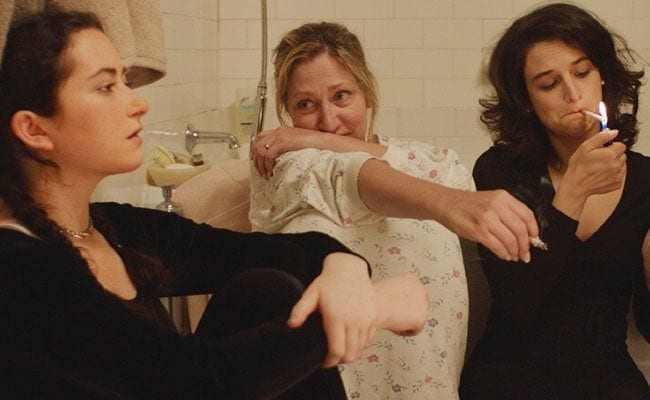
Landline is writer and director Gillian Robespierre’s highly anticipated follow-up to her critically well-received directorial debut, Obvious Child for which her co-writer, Elisabeth Holm, won the Red Crown Producer’s Award at the Sundance Film Festival in 2014. Robespierre keeps the artistic integrity of her first feature with the same creative team behind Obvious Child (2014), with Holm returning as a co-screenwriter and Jenny Slate (who burst onto the silver screen with Obvious Child in a star-making role) as an executive producer and lead actor. Set against the backdrop of Manhattan in the Giuliani-era ’90s, this nostalgic family drama boasts an all-star supporting cast including John Turturro, Edie Falco, Jay Duplass, Finn Wittrock, and newcomer Abby Quinn.
Dana (Slate) plays a disheveled art department employee for a magazine who finds herself in a transitional limbo, struggling to take her relationship with her fiancé, Ben (Duplass), to the logical next step of marriage as an old college friend, Nate (Wittrock) stirs up old romantic feelings, and the two begin an intense sexual but emotionally void affair. Her younger sister, Ali (Quinn), gives her parents more gray hairs each passing day as she casually procrastinates college applications, explores the blossoming rave scene, drugs, and sexual awakening.
Ali and Dana’s parents, Alan (Turturro) and Pat (Falco), now empty-nesters, have no kids left in the house to distract them from their failing marriage, filled with suspicions of infidelity and regret over career shortcomings. Alan is a copywriter for corporate snack brands, but has always aspired, and failed, to become a playwright. Ali and Dana find out through his hilariously risqué poems kept on his computer that he’s having an affair with his new muse and actor in his upcoming play, Carla. Together, they decide to move back in with their parents and repair their splintered family.
By seeing the effect infidelity has on her parents’ marriage, Dana overcomes her quarter life crisis and focuses on what is important to her, family and her relationship with Ben. Ali learns how to love without betrayal and promiscuity, and Alan and Pat move on in a cordial fashion, a natural progression.
Landline plays as a series of vignettes, dissecting each family member’s problems. Robespierre succeeds at making another candid, comedic portrayal of family dysfunction and difficult life transitions, this time from a multigenerational perspective. Detail-oriented in accentuating this period piece, she seemingly effortlessly captures everything from the alluring griminess of after-hour raves, to CD shopping at hipster record stores, trips to Blockbuster, poetry slams, the emergence of graffiti as an art form, Mac II floppy disks, and more pop culture references, including a hilarious reference to Helen Hunt’s visible cameltoe in the TV series, Mad About You (1992-1999).
Robespierre also makes sure to remind the viewer that the lovable cheesiness that was the ‘80s still lingers through songs like “Higher Love” by Steve Winwood or Stacey Q’s “Two of Hearts”. She even cleverly adds some political and social commentary in her story, condoning Giuliani’s lopsided funding of police reform, the implementation of the infamous and wildly ineffective and racist stop and frisk policy, and a nod to Hillary Clinton’s now-iconic pantsuits during one of her speeches as First Lady of the United States, told through several characters’ compliments of her attire.
Again, Slate is the standout in Robespierre’s follow-up to Obvious Child. As Dana, her neuroticism provides both much-needed comic relief and emotional depth, and her buoyant onscreen presence is infectious. Her spontaneous laughs are natural, timely, and honest, providing a realistic and unadulterated look into the workings of a thoughtful character with an aloofness that offers up adeptly executed, contagious laughs. Each mumble of self-deprecation, mannerism, and noise that comes out of Dana’s mouth is delivered with precision.
To Slate, Robespierre, and Holm’s credit, they deal with the subject of infidelity with non-judgmental ease. Dana is a truly good person who made a mistake, as is her father, Alan. This a refreshing take on the complexities of infidelity, which is often shown through the perspective of one-dimensional characters.
Robespierre and Holm develop their secondary characters in Ben, Ali, Alan, and Pat into believable people that are equally multidimensional as Slate’s Dana. The movie is at its best when these characters are bonding in intimate settings. For example, when Dana and Ali find themselves spending a night at their family country home, a deeply satisfying episodic montage ensues, and the two embrace the beauty of spontaneity, dancing, and making up characters for their alter egos as a way to comically come to terms with their seemingly inexplicable change in actions.
Indeed, the foundation of the film is the love story between these two sisters. Towards the film’s ending, Pat and her daughters, after finally opening up about Alan’s infidelity, share cigarettes together in the bathroom. Robespierre’s ability to deftly navigate these scenes with little dialogue, placing full confidence in and giving her actors freedom to interact, react, and improvise, is one of her many strengths.
Robespierre is one of the leading auteurs in a new generation of emerging female directorial talents. That more talented female directors are emerging is one of the best things to happen to the industry. It’s about time the world absorbs more films told from a woman’s perspective.


![Call for Papers: All Things Reconsidered [MUSIC] May-August 2024](https://www.popmatters.com/wp-content/uploads/2024/04/all-things-reconsidered-call-music-may-2024-720x380.jpg)



